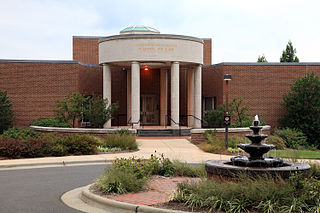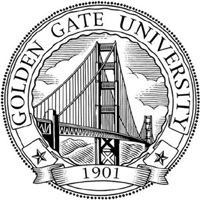
The University of Georgia School of Law is the law school of the University of Georgia, a public research university in Athens, Georgia. It was founded in 1859, making it one of the oldest American university law schools in continuous operation. Georgia Law accepted 14.77% of applicants for the class entering in 2023.

Loyola Law School is the law school of Loyola Marymount University, a private Catholic university in Los Angeles, California. Loyola was established in 1920.

The University at Buffalo School of Law is the law school of the University at Buffalo. Founded in 1887, and affiliated with Niagara University until 1891, it is the State University of New York (SUNY) system's only law school.

Quinnipiac University School of Law is the law school of Quinnipiac University located in North Haven, Connecticut. Quinnipiac Law is the newest law school in Connecticut, having received full accreditation from the American Bar Association (ABA) in 1992. It is a member of the Association of American Law Schools, and is currently ranked tied at 143rd by U.S. News & World Report.

University of Illinois Chicago School of Law is the law school of the University of Illinois Chicago, a public research university in Chicago, Illinois. Founded in 1899, it became affiliated with the university in 2019. The school offers programs for both part-time and full-time students, with both day and night classes available, and offers January enrollment.

Atlanta's John Marshall Law School (AJMLS) is a private for-profit law school in Atlanta, Georgia. It was founded in 1933 and named for John Marshall, the fourth chief justice of the Supreme Court of the United States. AJMLS is accredited by the American Bar Association.
The University of the District of Columbia David A. Clarke School of Law is the law school of the University of the District of Columbia, a public historically black land-grant university in Washington, D.C. It is named after David A. Clarke and was established in 1986 when, in response to a local grassroots campaign, the Council of the District of Columbia decided to take over assets of the Antioch School of Law, whose parent institution Antioch University had decided to close it in the face of increasing financial problems. The new school was named the University of the District of Columbia David A. Clarke School of Law in 1998.

The University of Florida Levin College of Law is the law school of the University of Florida located in Gainesville, Florida. Founded in 1909, it is the oldest operating public law school in Florida and second oldest overall in the state.

The University of North Carolina School of Law is the law school of the University of North Carolina at Chapel Hill. Established in 1845, it is one of the oldest law schools in the United States and is the oldest law school in the state of North Carolina.

The UA Little Rock William H. Bowen School of Law is a public law school, part of the University of Arkansas at Little Rock. The school is both American Bar Association (ABA) accredited and a member of the Association of American Law Schools (AALS).

Golden Gate University School of Law is the law school of Golden Gate University. Located in downtown San Francisco, California, Golden Gate Law is a California non-profit corporation and is fully accredited by the American Bar Association (ABA). On November 30, 2023, the law school announced that it will discontinue its J.D. program at the end of the current academic year, following years of financial hardship and non-compliance with the ABA's two-year bar pass rate requirement.

St. Mary's University School of Law is the law school of St. Mary's University, a private Catholic university in San Antonio, Texas.

Fordham University School of Law is the law school of Fordham University. The school is located in Manhattan in New York City, and is one of eight ABA-approved law schools in that city. In 2013, 91% of the law school's first-time test takers passed the bar exam, placing the law schools' graduates as fifth-best at passing the New York bar exam among New York's 15 law schools.

Wayne State University Law School is the law school of Wayne State University in Detroit. Wayne Law is located in Midtown, Detroit's Cultural Center. Founded in 1927, the law school offers juris doctor (J.D.), master of laws (LL.M.), online master of studies in law, and minors in law degree programs.
Widener University Delaware Law School is a private law school in Wilmington, Delaware. It is one of two separate ABA-accredited law schools of Widener University. Widener University Law School was founded in 1971 as the Delaware Law School and became affiliated with Widener in 1975. In 1989, it was known as Widener University School of Law when it was combined with the campus in Harrisburg, Pennsylvania. In 2015, the two campuses separated, with the Harrisburg one renamed to Widener University Commonwealth Law School.

Wake Forest University School of Law is the law school of Wake Forest University, a private research university in Winston-Salem, North Carolina. Established in 1894, Wake Forest University School of Law is an American Bar Association (ABA) accredited law school and is a member of the Association of American Law Schools (AALS). The current dean is Andrew R. Klein.
The University of Detroit Mercy School of Law is the law school of the University of Detroit Mercy and is located in Downtown Detroit, Michigan across from the Renaissance Center. Founded in 1912, Detroit Mercy Law is a private Roman Catholic law school and has been ABA-accredited since 1933. The Law School has an annual enrollment of 612 students including 223 Nonresident Aliens, and currently has 67 faculty members.
Michelle J. Anderson is an American lawyer who is the 10th President of Brooklyn College. She is a scholar on rape law.

Penn State Law, located in University Park, Pennsylvania, is one of two separately accredited law schools of the Pennsylvania State University. Penn State Law offers J.D., LL.M., and S.J.D. degrees. The school also offers a joint J.D./M.B.A. with the Smeal College of Business, a joint J.D./M.I.A. degree with the School of International Affairs, which is also located in the Lewis Katz Building, as well as joint degrees with other graduate programs at Penn State.
Widener University Commonwealth Law School is a law school located in Harrisburg, Pennsylvania, and part of Widener University, a private university in Chester, Pennsylvania. It is one of two separate ABA-accredited law schools of the university. It was founded in 1989 as an expansion of Widener University's law school in Wilmington. It awards the Juris Doctor degree in its full-time and part-time programs and is a member of the Association of American Law Schools (AALS).















